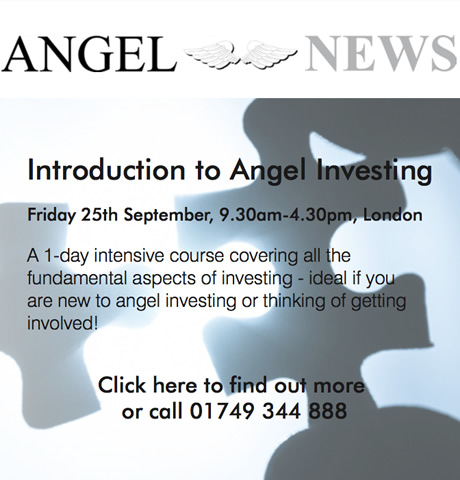Sign up to receive our Newsletter
For all the latest news and views from across the angel and early-stage investment sector, plus info and discounts for our industry leading events.
SIGN UP


Simon Murdoch
From 2001 to 2013 Simon was an active angel investing his own money in companies such as Shazam, LoveFilm and Zoopla. Since 2013, as Managing Partner of London based VC Episode 1, his full time focus has been investing the fund’s money. He still occasionally invests as an angel if a deal is outside Episode 1’s scope, or if Episode 1 first declines to invest and the company is unlikely to be of interest to Episode 1 for its next round.
- Sector focus: Early stage software driven businesses
- Regional Focus: mainly UK and tends to be mainly London and the South East as like to help the companies
- Typical investment size: Episode 1 likes to be the first institutional investor and invests from £250k to £1m in rounds of up to £2m. When investing as an angel, I tend to invest £25-50k and until 2013 I would often be the lead angel, though I never lead as an angel now due to the time pressures of running Episode 1.
PROFILE:
1) How long have you been a business angel?
My first angel investment was in 1999, so for 17 years
2) Why did you become a business angel?
I was a successful entrepreneur which can be very lucrative but is very high pressure and risky because you have all your eggs in one basket. I wanted to be a portfolio person investing in multiple companies, and I have found I really enjoy mentoring entrepreneurs.
3) How many investments have you made?
In about 35 companies as an angel, and nearly 30 more as a VC.
4) What is the best investment you ever made – either financially or simply “for the ride”?
Natural Motion run by Torsten Reil was my best investment and I really enjoyed seeing how Torsten developed as an entrepreneur and CEO. I first invested in 2001 when Torsten stopped pursuing his PhD at Oxford to found the company. He learned so much over the years becoming the company’s best salesman, and successfully raising several VC rounds. The company was sold to Zynga for $545m in early 2014. I received 76x on the first round and 48x blended on my whole investment in the company.
5) What is the most important thing an angel can bring to the party (apart from capital)?
Advice for the management especially the CEO of a business. It is very important though that as angel you realise that the management should not do everything you say. I like to invest in CEOs who listen to our advice, take note of it and follow it a lot of the time but not all of the time. It’s no fun if they take no notice of our advice – and more likely to fail – but also if they do everything we say then they aren’t strong enough characters to build a great business.
6) The one that got away! Is there an investment you wish you had made?
While we were raising our VC fund we met Deliveroo. We really liked founder Will Shu and the business proposition. We discussed putting together a syndicate rather than just an angel investment, and it slipped through the cracks because we were busy with raising our VC fund, and he was more attracted to other investors who had more money at their disposal more quickly. Shame. I think Deliveroo is likely to overtake Just Eat in terms of valuation in the long term.
7) What is the most important lesson you have learnt about investing in early-stage and start-up businesses?
You have to be diversified into at least 10 businesses and ideally 20 or more. A quarter or more of your investments are likely to fail and you will lose money. A small proportion will make spectacular returns and you need to be well diversified to catch some of those.
8) What is the most important piece of advice you’d give a new entrepreneur?
Chose a market and a sales proposition which can become a big business. If your idea is a FNAC (Feature Not a Company), then pivot and spend your time and energy doing something with much more upside potential. Then use the Customer Development methods of The Mom Test and other books to test your sales proposition before you raise any serious money.
9) Young first-time entrepreneurs or seasoned serial entrepreneurs?
Both – see earlier about diversification. Serial entrepreneurs’ companies often have higher valuations and should have a better chance of succeeding as businesses, but young entrepreneurs tend to work harder and more passionately because they have something to prove and your investment can give better returns if you start at a lower valuation.
10) What is the most important piece of advice you would give to a new angel?
Observe experienced angels by co-investing with others. Early stage businesses take a long time to play out, eg Zoopla was 7 years from start up to IPO and in the UK that is quite fast. Natural Motion was 13 years from start up to trade sale which is not uncommon. So don’t invest your money too quickly. Take several years to build up that portfolio of 10-25 companies. See this baseball analogy of investing.
11) What’s the highest acceptable pre-money valuation for a start-up?
There is no right answer to this. For Episode 1 and as an angel, I like businesses valued between £1m and £4m pre money, and I have to believe that if the business works we will make at least 10x.
12) Tax breaks or preferred shares?
Episode 1 always takes Seed Preferred shares for technical reasons and because we can’t have the tax breaks with our type of fund. As an angel nowadays I usually take Ordinary shares with SEIS/EIS tax benefits.
13) Email or phone?
For what? I use both and have lots of face to face meetings.
14) London or Silicon Valley?
It’s best to be close to your investee companies, so of course because I want to live near, I invest here in London and elsewhere in the UK. Silicon Valley is a singularity in itself and while I admire what they achieve I wouldn’t want to live in that bubble.
15) When you have those rare moments of free time, what do you to relax?
I have five children and they keep me busy and grounded. I try to and generally succeed in not working at all at weekends so I can spend plenty of time with the family.
Add a comment:
We want your news! please send press releases to [email protected].




